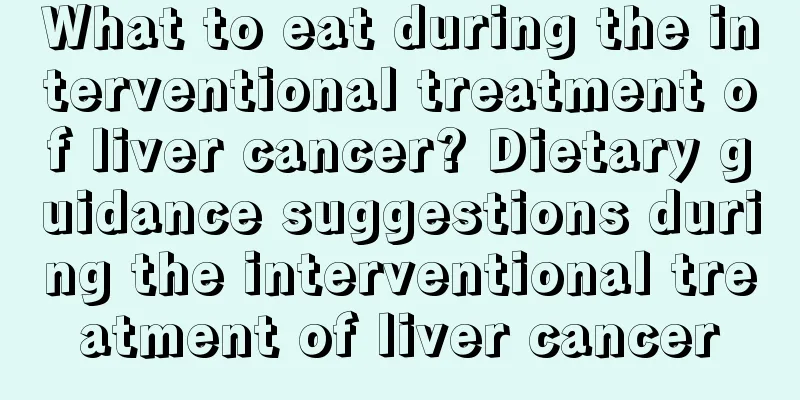What to eat during the interventional treatment of liver cancer? Dietary guidance suggestions during the interventional treatment of liver cancer

|
Among the treatment methods for liver cancer, interventional therapy is also a commonly used one, and because of its good therapeutic effect, many patients use this method. So what should the diet of liver cancer patients be like during interventional therapy? The following dietary principles can be used to arrange the patient's diet reasonably. The patient's body is weak during treatment, so you must be careful about your diet. First of all, you should avoid irritating foods and foods high in plant fiber to avoid rupture and bleeding of the esophagus or gastric veins in patients with liver cirrhosis. Eat more fresh vegetables and fruits, and use fruit juice drinks to supplement vitamins. Patients with fever should drink more water to help dissipate heat. Those who vomit frequently should temporarily fast to avoid food irritating the stomach, increasing the number of vomiting, and consuming physical strength. Patients with ascites should limit sodium intake and give a low-salt or salt-free diet. Patients in the early stage of hepatic coma or hepatic coma should be given a low-protein diet with a total daily protein of 20-40g. Try to use animal proteins with high physiological value, such as milk, eggs, lean meat, etc. In addition, patients should be given food that is easily digestible and absorbable, otherwise it is easy to cause indigestion and other problems. Generally, protein is calculated at 1.5-2g/kg per day to ensure the repair of tissues in the body and increase the body's immune function. Patients are encouraged to eat more fresh vegetables, fruits and melons to provide richer vitamins and inorganic salts. One week after interventional treatment, liver ischemia affects the storage of liver glycogen and protein synthesis. If plasma protein is lower than 25g/L, albumin should be intravenously infused, glucose should be supplemented in appropriate amounts, and the balance of water and electrolytes should be maintained. After interventional treatment of liver cancer, the diet should be supplemented with high protein, appropriate calories and rich vitamins. Liver cancer patients should fast for 2 to 3 days after interventional treatment to relieve nausea and vomiting. Calories should be calculated according to the patient's weight and condition, and sufficient fluids and nutrients should be supplemented intravenously. In the early stage of eating, liquids should be consumed and small meals should be taken, about 200 ml each time, once every 2 to 3 hours. Milk, soy milk, rice soup, thin lotus root powder, fruit juice, vegetable juice, gravy, etc. can be given. |
>>: What are the treatments for lung cancer? 5 most effective treatments for lung cancer
Recommend
Can I eat grapes with shrimps?
Shrimp is a very popular ingredient in our life. ...
Why does my right side of the stomach hurt when I walk?
Perhaps everyone has had this feeling: pain on th...
Bowel cancer stool characteristics
Bowel cancer is a topic that sounds a little scar...
What causes brain cancer?
The causes of brain tumors are not very clear. Mo...
Ten ways to improve your memory
Memory is the reflection of past experiences in t...
Symptoms and current status of colon cancer
Do you know what colon cancer is? Do you understa...
How to sterilize glass baby bottles
Milk bottles are mainly used to hold milk. As for...
Nicotine Replacement Therapy
There are a lot of people smoking now, especially...
Use Coke after dyeing hair black
Many people may think that cola can be used for s...
Is reflux esophagitis serious? Understand these things
Reflux esophagitis is a common clinical disease. ...
How to use white vinegar to whiten your face?
White vinegar should be very familiar to us, beca...
What's wrong with the soreness in my knees
Everyone's physical fitness is different. Som...
How to preserve scallops better
If the scallops you buy cannot be cooked in time,...
Is it right not to treat lung cancer in an 80-year-old man?
It is not entirely correct to not intervene in th...
Can you walk more if you have brain cancer?
Intracranial malignant tumors mainly include glio...









